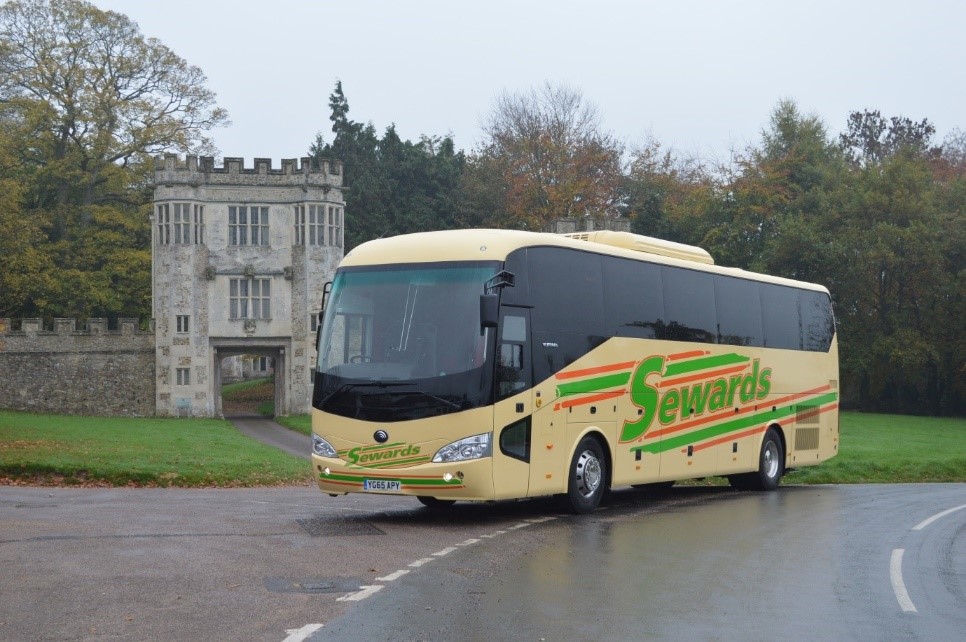
Do we Under-value our Coach Operators?
By Steve Warburton
The UK coach industry is a strange and diverse beast. If we exclude the ‘big hitters’ on the express services front, the industry is almost precisely in the form that the late Nicholas Ridley envisaged the bus industry being post-deregulation in that it is principally made up of smaller companies, often family-owned, serving fairly small markets on very tight margins but having intimate knowledge of what they do and who their regular customers are.
While each operator knows what it does, few others do and that is one of the industry’s problems. There is no annual collation of coach data by the Office of National Statistics or the DfT. Coaching lacks the big political clout of a Go-Ahead or Stagecoach, which is why it is so good to see the CPT campaigning on the industry’s behalf1.

Photo credit Swards Coaches of Devon – www.sewardscoaches.co.uk
Diversity is certainly a trait of the coach business. There probably is no simple answer to the simple question of ‘what does a coach operator do?’. There are those who supply superannuated fleets to ferry schoolchildren to and from school and very little else; there are those who do indeed ‘do’ school transport, but who have different strands of the business built on including the traditional day excursion market, concerts, away matches, private hire, pretending to be trains and what used to be called ‘extended tours’, taking a group away for several days staying overnight in hotels.
There are specialists too, such as those providing very upmarket transport for music groups on tour, anything from Orchestra to Ozzy Osbourne. In recent years, the growth of the cruise ship trade has been intrinsically linked with coaches. Berths for huge ships are seldom in convenient or especially scenic spots. Their occupants want to go places and see things, if necessarily briefly, unless that is, they have a particular penchant for shipping containers.
As an aside, the bus and coach industry might legitimately worry about the point at which passengers will feel safe travelling together but those concerns must be writ large for cruise ships after being described as ‘floating petri dishes for disease’ and so on. It’s difficult to envisage a rush back to cruising.
The rail industry’s recent attempt to make PSVAR provisions apply across the industry at short notice only goes to show that even one of the industry’s biggest customers doesn’t understand it. For one, the coach industry lacks the largesse of franchise payments to fund complete (and probably unnecessary) fleet replacement.
Does this diversity make it difficult to get the coach industry’s message across? Almost certainly yes; and difficult too for the beneficiaries of the coach industry to be fully aware of and measure the value that coaches bring. In particular, what would things look like if there was large scale collapse of coach businesses, which is a very real threat? As examples:
- Do tourist hotspots like Windsor or Chester appreciate how much traffic congestion volumes and demand for car parking spaces would grow without coaches?
- Do organisations such as the National Trust and English Heritage appreciate what proportion of their income comes from coach parties?
- What would happen to accident statistics due to drink driving if every hen or stag party and wedding reception was wholly by car?
- Is even the link between the viability of many hotels and coach parties understood?
- Who can put a social value on a day trip or short break by coach for someone who otherwise wouldn’t go far or have any holiday?
- How many politicians even appreciate that the bus industry and the coach industry are very different beasts indeed?
The coach industry versus the private car is a very similar comparison to shifting freight by rail or road. It makes sense to use one unit to carry lots of things (or passengers) over a distance than in many smaller units, provided you get the end distribution (or assembly) right.
Without coaches I suggest we’re a lot worse off as a nation, where those without cars are excluded from many things, where every tourist hotspot is gridlocked and where the historic approach to any castle, garden or abbey is covered by a sea of shiny metal parked cars.
So good luck to the CPT and here’s hoping the governments in Westminster and the devolved nations come to appreciate the value of the coaching sector.
[1] http://www.cpt-uk.org/index.php?fuseaction=newsevents.list_news&news_id=1417




0 Comments